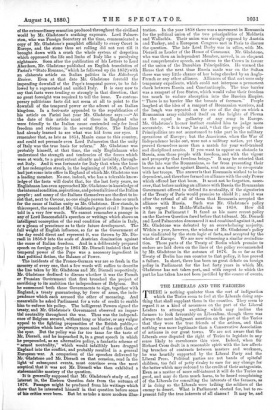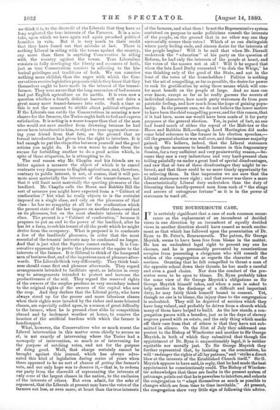THE LIBERALS AND THE FARMERS
THERE is nothing quainter than the sort of indignation which the Tories seem to feel at the Liberals doing any- thing that shall supplant them in the counties. They seem to regard it as a kind of meanness on the part of the Liberal Leaders to attempt anything which may incline the farmers to look favourably on Liberalism, though there was always the most indignant assertion on the part of the Tories that they were the true friends of the artisan, and that nothing was more legitimate than a Conservative Association of artisans in our great towns. We are not aware that the Liberals ever disputed the right of Tories to legislate in any sense likely to corroborate this view. Indeed, when Sir Richard Cross dealt in a reasonable spirit with the law affect- ing breaches of contracts between masters and workmen, he was heartily supported by the Liberal Party and the Liberal Press. Political parties are not bands of spiteful children, too full of petty rivalry to care for any change for the better which may redound to the credit of their antagonists. Even as a matter of mere self-interest it will do the Tories no good, and may do them much harm, to be heard complaining of the Liberals for consulting the interests of the farmers, as if in doing so the Liberals were bribing the soldiers of the enemy to desert. What is Parliament elected for, but to re- present fully the true interests of all classes 1 It may be, and
we think it is, to the discredit of the Liberals that they have so long neglected the true interests of the Farmers. It is a mis- take, upon which we have again and again preached political homilies in vain. But it is very much to their credit that they have found out that mistake at last. There is nothing Liberal in siding with the towns against the country, any more than there is anything Conservative in siding with the country against the towns. True Liberalism consists in fully developing the liberty and resources of both, just as true Conservatism consists in adhering to the his- torical privileges and traditions of both. We can conceive nothing more childish than the anger with which the Con- servatives receive legislative proposals which they know that they themselves ought to have made in the interest of the tenant- farmer. They were aware that the long succession of bad seasons had put English agriculture on its mettle. It is even now a question whether a fourth deficient harvest will not drive a great many more tenant-farmers into exile. Such a time as this is not the moment to stickle about political etiquettea. If the Liberals can outdo the Conservatives in securing a new chance for the farmers, the Tories ought both to feel and express satisfaction. It is acting in a worse temper than that of the man who would not save another from drowning because he had never been introduced to him, to object to your opponent's rescu- ing your friend from that fate, on the ground that no formal introduction hal given him the right to interfere. It is bad enough to put the etiquettes between yourself and the good actions you might do. It is even worse to make them the excuse for forbidding another to do a good action which, in spite of those etiquettes, he is attempting to do.
The real reason why Mr. Chaplin and his friends are so bitter against a measure the object of which is to cancel contracts very dangerous to English agriculture, and, therefore, contrary to public interest, is not, of course, that it will pro- mote most materially the interests of the tenant-farmer, but that it will limit most materially the sporting pleasures of the landlord. Mr. Chaplin calls the Hares and Rabbits Bill the sort of measure you might have expected from a " Cabinet of confiscation ;" but what he really objects to is the restraint imposed on a single class, and only on the pleasures of that class : he has no sympathy at all for the confiscation which the present state of the law imposes on another class,—and not on its pleasures, but on the most absolute interests of that class. The present is a " Cabinet of confiscation," because it proposes to put an end to the power of the landlord, after he has let a farm, to rob his tenant of all the profit which he might derive from the occupancy. What is proposed is to confiscate a few of the landlords' pleasures, in order that the most essential of the tenants' interests may be confiscated no longer. And that is just what the Squires cannot endure. It is Con- servative apparently to prefer the pleasures of the squire to the interests of the farmer. It is illiberal to think of the hampered men of business first, and of the imperious men of pleasure after- wards. The Liberals think very differently. They think busi- ness should come first and pleasure afterwards. They regard arrangements intended to facilitate sport, as inferior in every way to arrangements intended to protect and increase the productiveness of the soil. They regard the reserved rights of the owners of the surplus produce as very secondary indeed to the original rights of the owners of the capital who sow the crop. And they declare that the Liberal party, who have always stood up for the poorer and more laborious classes when their rights were invaded by the richer and more leisured classes, are especially called upon, in a season of great difficulty to the farmer, when he is pressed close alike by competition abroad and by inclement weather at home, to remove the heaviest of the artificial burdens with which the farmer is handicapped.
What, however, the Conservatives who so much resent the Liberal intervention in this matter seem chiefly to accuse us of, is not exactly of intervening where the Tories had a monopoly of intervention, so much as of intervening for the purpose of catching votes, and not for the purpose of doing good. Well, that charge certainly cannot be brought against this journal, which has always advo- cated this kind of legislation during series of years when there appeared to be no sort of chance of getting the farmer's vote, and our only hope was to deserve it,—that is, to redeem our party from the discredit of representing the interests of only some of the largest classes in the nation, to the exclusion cf the interests of others. But even admit, for the sake of argument, that the Liberals at present may have the votes of the farmers not less, or even more, at heart than the true interests
of the farmers, and what then ? Is not the Representative system contrived on purpose to make politicians consult the interests of the people, on the ground that in no other way can they successfully secure their votes ? Which of us can distinguish where party feeling ends, and sincere desire for the interests of the people begins ? Will it be said that when Mr. Disraeli undertook the " education " of his party on the question of Reform, he had only the interests of the people at heart, and the votes of the masses not at all ? Will it be argued that when the late Lord Derby consented " to dish the Whigs," he was thinking only of the good of the State, and not in the
least of the votes of the householders Politics is nothing but the art of compelling, as far as possible, the desire for power to seek its gratification by using those means which will con- fer most benefit on the people at large. And no man can ever know, except so far as he really guesses the secrets of individual character, how much party statesmen do from pure patriotic feeling, and how much from the hope of gaining popu- larity. In the present case, we do not believe the lower motive to have been the chief compelling power, and for this reason, that if it had been, more use would have been made of it for party purposes at the general election. Yet, in point of fact, no one had heard much of either the repeal of the Malt-tax or the Hares and Rabbits Bill,—though Lord Hartington did make some brief reference to the former in his election speeches,— till the general election was well over, and the immense majority gained. We believe, indeed, that the Liberal statesmen took up these measures to benefit farmers in this fragmentary Session, for a very sufficient and very praiseworthy reason,—be- cause they saw a very industrious and very hard-pressed class toiling painfully on under a great load of special disadvantages, and saw that of-two of these disadvantages they might be re- lieved, and that there could be no more timely opportunity for so relieving them. In that impression we are sure that the Liberal statesmen were right ; and that never was there a more characteristically Liberal duty undertaken than the duty of liberating these hardly-pressed men from such of " the slings and arrows of outrageous fortune" as it is in the power of statesmen to ward off.































 Previous page
Previous page